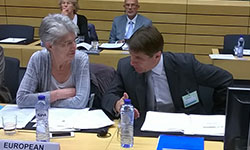BusinessEurope Headlines No. 2015-26
EU employer organisations and trade unions unveil new work programme and in-depth employment analysis
 The EU social partners' fifth autonomous work programme, a ‘Partnership for inclusive growth and employment’, sets the course for joint actions for 2015-2017. The EU social partners have also agreed on a joint in-depth employment analysis of the functioning of European labour markets. Eight years after their first joint analysis, they provide key recommendations to address challenges stemming from the crisis and structural issues. Those recommendations, presented at a press conference on 14 July, include the potential of social dialogue to deliver growth and employment, the need to address Europe's weakness in terms of job creation, the need to foster productivity and the importance of fighting inequalities and poverty. The aim is to mobilise the European social dialogue to deliver more growth, more jobs, taking diverse economic and social situations across Europe into account.
The EU social partners' fifth autonomous work programme, a ‘Partnership for inclusive growth and employment’, sets the course for joint actions for 2015-2017. The EU social partners have also agreed on a joint in-depth employment analysis of the functioning of European labour markets. Eight years after their first joint analysis, they provide key recommendations to address challenges stemming from the crisis and structural issues. Those recommendations, presented at a press conference on 14 July, include the potential of social dialogue to deliver growth and employment, the need to address Europe's weakness in terms of job creation, the need to foster productivity and the importance of fighting inequalities and poverty. The aim is to mobilise the European social dialogue to deliver more growth, more jobs, taking diverse economic and social situations across Europe into account.
Read more or contact: Maxime Cerutti
Markus J. Beyrer at Macro-economic Dialogue (MED) at political level
 Speaking on 13 July, BusinessEurope Director General welcomed the unanimous compromise found only a few hours earlier at the Euro-area summit, sharing views with European Commission Vice-President Valdis Dombrovskis and Luxembourg Minister of Finance Pierre Gramegna – who had been personally involved in the negotiations. The situation in Greece, Beyrer noted, should not detract from the fact that overall we have seen an improvement in the economic situation of the EU since the last MED in February. However, to support a stronger recovery over the long term Europe must address structural obstacles to growth and improve competitiveness. EU countries such as Ireland, Spain and Portugal, which undertook structural reforms in the past, have now begun to reap benefits.
Speaking on 13 July, BusinessEurope Director General welcomed the unanimous compromise found only a few hours earlier at the Euro-area summit, sharing views with European Commission Vice-President Valdis Dombrovskis and Luxembourg Minister of Finance Pierre Gramegna – who had been personally involved in the negotiations. The situation in Greece, Beyrer noted, should not detract from the fact that overall we have seen an improvement in the economic situation of the EU since the last MED in February. However, to support a stronger recovery over the long term Europe must address structural obstacles to growth and improve competitiveness. EU countries such as Ireland, Spain and Portugal, which undertook structural reforms in the past, have now begun to reap benefits.
Read more or contact: Frederik Lange
Trade policy for the 21st century
 With a view to the upcoming revision of EU’s trade strategy, BusinessEurope has adopted a position paper with key priorities for a modern and effective trade policy from the point of view of European business. The paper stresses the importance of having business and companies at the forefront of the EU trade policy. Meaningful trade and investment openings lead to more competitiveness and growth for European industries. This can be achieved through the conclusion of ongoing bilateral and multilateral negotiations, as well as via a review of older agreements, the development of specific strategies towards major trading partners, and better implementation and streamlining of the adoption process of agreements. In this framework, attention should be paid to the role of services in trade liberalisation. An ambitious agenda, beyond the GATS – General Agreement on Trade in Services – should be promoted. Furthermore, internationalisation of SMEs should be enhanced, promoting their participation in global value chains and new opportunities in third markets. Finally, BusinessEurope supports a clear and consistent investment policy that comprises market access and protection of investment, including a reformed and effective investor-state dispute settlement mechanism.
With a view to the upcoming revision of EU’s trade strategy, BusinessEurope has adopted a position paper with key priorities for a modern and effective trade policy from the point of view of European business. The paper stresses the importance of having business and companies at the forefront of the EU trade policy. Meaningful trade and investment openings lead to more competitiveness and growth for European industries. This can be achieved through the conclusion of ongoing bilateral and multilateral negotiations, as well as via a review of older agreements, the development of specific strategies towards major trading partners, and better implementation and streamlining of the adoption process of agreements. In this framework, attention should be paid to the role of services in trade liberalisation. An ambitious agenda, beyond the GATS – General Agreement on Trade in Services – should be promoted. Furthermore, internationalisation of SMEs should be enhanced, promoting their participation in global value chains and new opportunities in third markets. Finally, BusinessEurope supports a clear and consistent investment policy that comprises market access and protection of investment, including a reformed and effective investor-state dispute settlement mechanism.
Read more or contact: Luisa Santos
BusinessEurope at 7th EU-Asia Top Economist Round Table
 On 10 July, Director General Markus J. Beyrer went to Dublin to speak at the 7th EU-Asia Top Economist Round Table about the importance of EU-Asia trade in the global economic infrastructure. The half-day programme featured discussions on the strategic, economic and business perspectives on the future outlook between the two regions. Asia holds excellent business opportunities for European companies, as it is undoubtedly a key engine for global economic growth. Various agreements between the EU and Asian countries are currently under negotiation and are a good measure of how Europe views Asia’s growth potential and business opportunities.
On 10 July, Director General Markus J. Beyrer went to Dublin to speak at the 7th EU-Asia Top Economist Round Table about the importance of EU-Asia trade in the global economic infrastructure. The half-day programme featured discussions on the strategic, economic and business perspectives on the future outlook between the two regions. Asia holds excellent business opportunities for European companies, as it is undoubtedly a key engine for global economic growth. Various agreements between the EU and Asian countries are currently under negotiation and are a good measure of how Europe views Asia’s growth potential and business opportunities.
Contact: Maurice Fermont
Energy in TTIP: an economic and strategic interest
 The energy chapter in the Transatlantic Trade and Investment Partnership is important from an economic and strategic point of view, BusinessEurope highlighted on 15 July at the TTIP stakeholder event organised in the context of the tenth negotiating round taking place in Brussels this week. Not only EU companies depend on open raw material and energy markets to be able to source at competitive prices and reduce the prohibitively high energy costs that hinder their competitiveness. Access to secure, diversified and reliable energy sources is also in Europe’s strategic interest. European companies ask for provisions in TTIP that will ensure improved market access and transparent, non-discriminatory rules addressing the current US export restrictions.
The energy chapter in the Transatlantic Trade and Investment Partnership is important from an economic and strategic point of view, BusinessEurope highlighted on 15 July at the TTIP stakeholder event organised in the context of the tenth negotiating round taking place in Brussels this week. Not only EU companies depend on open raw material and energy markets to be able to source at competitive prices and reduce the prohibitively high energy costs that hinder their competitiveness. Access to secure, diversified and reliable energy sources is also in Europe’s strategic interest. European companies ask for provisions in TTIP that will ensure improved market access and transparent, non-discriminatory rules addressing the current US export restrictions.
Read more or contact: Eleonora Catella
Employer engagement crucial for well-functioning apprenticeship systems
 In countries that are looking to develop and strengthen their apprenticeship systems it is important that there is a mutual understanding and an appropriate division of responsibilities between the main actors in order to achieve a well-functioning system. Employers know best what skills are required on the labour market, so their views should be taken on board when the curricula are being designed. How to achieve this in different systems was one of the key themes addressed during the latest cluster seminar of the BusinessEurope-led project on the cost-effectiveness of apprenticeship schemes that took place on 9-10 July in Budapest. This seminar gathered representatives of employers and vocational education and training providers from Hungary, Latvia and Greece.
In countries that are looking to develop and strengthen their apprenticeship systems it is important that there is a mutual understanding and an appropriate division of responsibilities between the main actors in order to achieve a well-functioning system. Employers know best what skills are required on the labour market, so their views should be taken on board when the curricula are being designed. How to achieve this in different systems was one of the key themes addressed during the latest cluster seminar of the BusinessEurope-led project on the cost-effectiveness of apprenticeship schemes that took place on 9-10 July in Budapest. This seminar gathered representatives of employers and vocational education and training providers from Hungary, Latvia and Greece.
Contact: Robert Plummer
Small Business Act Follow-up Group discusses review of working time directive
 "Revising the working time directive would not be a fruitful policy line", BusinessEurope’s Director of Entrepreneurship and SMEs Daniel Cloquet said at the meeting of the Small Business Act (SBA) Follow-up Group on 8 July. The SBA Follow-up Group is a consultative group established to make recommendations for proper implementation of the SBA principles by the European Commission. The meeting discussed the outlook for a possible revision of the working time directive. The directive, Daniel Cloquet stressed, has a clear impact on SMEs, as many of the rules are overly detailed and prescriptive, and therefore complicated and costly for business to apply. At the same time, business – in some cases through collective agreements – has found ways to operate within the framework of the directive. For this reason, BusinessEurope does not support a revision of the directive at this time. If the European Commission decides to go ahead with a revision, it should take a targeted approach to dealing with the legal uncertainty and practical problems caused by the ECJ rulings, in particular on on-call time and paid annual leave.
"Revising the working time directive would not be a fruitful policy line", BusinessEurope’s Director of Entrepreneurship and SMEs Daniel Cloquet said at the meeting of the Small Business Act (SBA) Follow-up Group on 8 July. The SBA Follow-up Group is a consultative group established to make recommendations for proper implementation of the SBA principles by the European Commission. The meeting discussed the outlook for a possible revision of the working time directive. The directive, Daniel Cloquet stressed, has a clear impact on SMEs, as many of the rules are overly detailed and prescriptive, and therefore complicated and costly for business to apply. At the same time, business – in some cases through collective agreements – has found ways to operate within the framework of the directive. For this reason, BusinessEurope does not support a revision of the directive at this time. If the European Commission decides to go ahead with a revision, it should take a targeted approach to dealing with the legal uncertainty and practical problems caused by the ECJ rulings, in particular on on-call time and paid annual leave.
Contact: Daniel Cloquet
Underlining the high value of the Junior Enterprise concept and of JADE’s achievements
 “JADE is making an outstanding contribution to promoting entrepreneurship” BusinessEurope’s Director of Entrepreneurship and SMEs Daniel Cloquet said at the ceremony organised by JADE (the European Confederation of Junior Enterprises) to celebrate the handover between the JADE 2014-2015 Executive Board chaired by Ioana David and the new Executive Board, which will be chaired by Daniela Runchi. The ceremony took place on 14 July at the European Parliament. Daniel Cloquet, as a member of the JADE Advisory Board, called for reinforced synergies between JADE and BusinessEurope to improve the environment for young entrepreneurs in Europe.
“JADE is making an outstanding contribution to promoting entrepreneurship” BusinessEurope’s Director of Entrepreneurship and SMEs Daniel Cloquet said at the ceremony organised by JADE (the European Confederation of Junior Enterprises) to celebrate the handover between the JADE 2014-2015 Executive Board chaired by Ioana David and the new Executive Board, which will be chaired by Daniela Runchi. The ceremony took place on 14 July at the European Parliament. Daniel Cloquet, as a member of the JADE Advisory Board, called for reinforced synergies between JADE and BusinessEurope to improve the environment for young entrepreneurs in Europe.
Contact: Daniel Cloquet
Calendar

- 9 September 2015: State of the Union speech by European Commission President Jean-Claude Juncker
- 10 September 2015: Your next edition of BusinessEurope Headlines – Have a nice summer break!
- 30 Sep-2 Oct 2015: European Forum for New Ideas, Sopot (Poland)
Contact: BusinessEurope Headlines